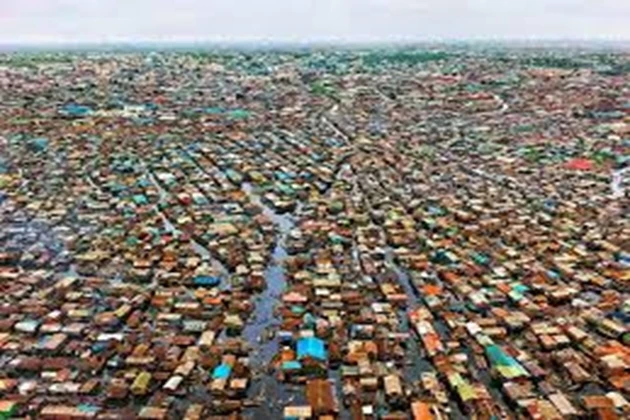The world is filled with slums, such as the fabled Kowloon in Hong Kong, the Brazilian Rocinha, and Kenya’s Kibera. However, Makoko’s primary feature is its location on the water. The Lagos suburb is sometimes called the “Venice of Africa.” The community was first established as a tiny fishing village in the 1800s.
Because of the handy location, the fisherman had a market for their goods. The future slums and the city across the harbor grew together until. Eventually, they became one area. Makoko’s current population is thought to be 80,000 people. Such information is provided via official statistics.
There has never been an accurate census, although volunteers, researchers, and visitors estimate that there may be as many as a quarter of a million. These folks are all devoid of the comforts of civilization and live in abject poverty.
View of the Makoko
No one planned the water part of the settlement; the streets originate on land and move away in a straight line deep into the bay. Naturally, these houses do not have official addresses and mailboxes.
Almost all the people living here are engaged in areas related to fishing and algae cultivation. Many people last visited the land a few years ago. A more or less comfortable life begins on the first 2-3 lines from the shore.
A typical street
This is what an ordinary street in Makoko looks like. It is not the best, but it is also far from the worst slum area. Such paintings seem attractive to a person spoiled by the benefits of civilization—a real exotic, which is rarely found in a developed country. However, imagine you were there not for a few days but forever.
Floating Merchants
Enterprising merchants supply the slums by buying the most marketable goods in the city and taking them by boat to Makoko. Drinking water is in constant demand and is nowhere to be taken, despite the location: human waste products have made the water in the bay not just dirty but black. Visibility does not exceed a few centimeters. It’s hard to imagine how much effort it takes to clean up this place.
Barbershop
Another type of service that will always be in demand everywhere. People need to get a haircut, sometimes even if they live in Makoko. The establishment’s owner is a local celebrity and authority, and his barber shop is a landmark for boaters. The presence of electricity indicates an increased level of prosperity.
School
The birth rate here is equal to the average in Nigeria; that is, there are a lot of children. They are often sent to work from an early age, which is even justified in this case. There’s nothing else to do here; you can learn useful skills on the boat.
There is not a single school in the district. Volunteers built the school independently in 2013 but sank three years later. The city authorities refused to participate in the new project, offering everyone the chance to move to Lagos.
The poorest streets of the slums
Any slum has its gradation, where the poorest dwellings and relatively prosperous households stand out. This is what Makoko’s worst neighborhood looks like: the houses are made of junk that seems to have been fished out somewhere nearby. V I S I T A F R I N I K . C O M to read the complete article. According to journalistic research, a decent house costs about $3,000. For permission to move in, some money must be paid to the local head. The price tag is not fixed and is determined during a personal conversation.
The elite new building
This is how elite houses look by local standards. Not only are there two whole floors, but the roof is not made of straw that will withstand any rain. Indeed, the owners have several personal boats. It is large for working in the open sea and more minor for navigating the narrow streets. There is even electricity in the area, which is a real luxury in Makoko.
The fish market
The freshest fish is sold in the suburb of Makoko, if this part of the bay can be called that. Men are at sea or resting after a working day, and wives try to sell the catch. If money is not possible, the product is exchanged for something else. Unlike many other slums, no one is dying of hunger here; the main threat is unsanitary conditions.
Wood Bar
The Wood Bar is located in the very center of Makoko. It is instead a tourist center. Most of the local population cannot afford an evening at this institution. The owner assures that cold beer is always on sale, straight from the refrigerator, which is undoubtedly a luxury in local realities.
Tourism in Makoko
The slums of Makoka are in high demand in the tourism sector. It is not safe for a person with a European appearance here. All services, including a taxi boat, will cost 10 or even 100 times more than the usual price list. On the other hand, residents of the prosperous areas of Lagos come here for a few cool photos. As in the whole world, people take selfies, share their impressions on social networks, and discuss injustice but do not take any action.
